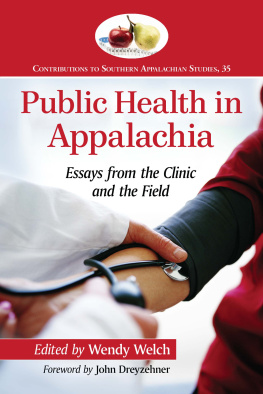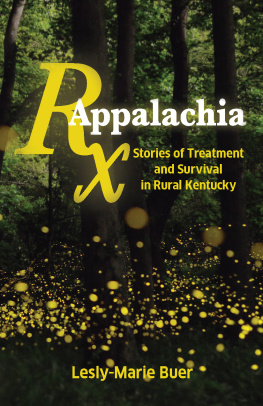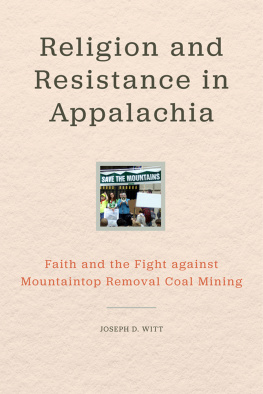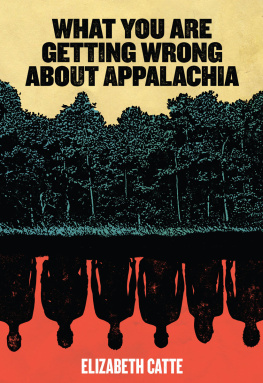Rereading Appalachia
REREADING
APPALACHIA
Literacy,
Place, and
Cultural Resistance
Edited by
Sara Webb-Sunderhaus
and Kim Donehower

Due to variations in the technical specifications of different electronic reading devices, some elements of this ebook may not appear as they do in the print edition. Readers are encouraged to experiment with user settings for optimum results.
Copyright 2015 by The University Press of Kentucky
Scholarly publisher for the Commonwealth,
serving Bellarmine University, Berea College, Centre College of Kentucky, Eastern Kentucky University, The Filson Historical Society, Georgetown College, Kentucky Historical Society, Kentucky State University, Morehead State University, Murray State University, Northern Kentucky University, Transylvania University, University of Kentucky, University of Louisville, and Western Kentucky University.
All rights reserved.
Editorial and Sales Offices: The University Press of Kentucky
663 South Limestone Street, Lexington, Kentucky 40508-4008
www.kentuckypress.com
Library of Congress Cataloging-in-Publication Data
Names: Webb-Sunderhaus, Sara. | Donehower, Kim.
Title: Rereading Appalachia : literacy, place, and cultural resistance / edited by Sara Webb-Sunderhaus and Kim Donehower.
Description: Lexington, Kentucky : University Press of Kentucky, 2015. | Series: Place matters : new directions in Appalachian studies | Includes bibliographical references.
Identifiers: LCCN 2015033892 | ISBN 9780813165592 (hardcover) |
ISBN 9780813165615 (pdf) | ISBN 9780813165608 (epub)
Subjects: LCSH: LiteracySocial aspectsAppalachian Region. | Appalachians (People)Social life and customs.
Classification: LCC LC152.A66 R47 2015 |
DDC 302.2/2440974dc23
LC record available at http://lccn.loc.gov/2015033892
This book is printed on acid-free paper meeting the requirements of the American National Standard for Permanence in Paper for Printed Library Materials.

Manufactured in the United States of America.

| Member of the Association of
American University Presses |
To the mountains
and their people
Contents
Sara Webb-Sunderhaus and Kim Donehower
Kim Donehower
Krista Bryson
Emma M. Howes
Todd Snyder
Gregory E. Griffey
Kathryn Trauth Taylor
Nathan Shepley
Joshua Iddings and Ryan Angus
Sara Webb-Sunderhaus
Peter Mortensen
Introduction
Sara Webb-Sunderhaus and Kim Donehower
In Somethings Rising, Silas House and Jason Howard write of the Appalachian activists whose testimonies they collect: The people you will meet here are storytellers. They all speak of stories as a force that sustains them, just as the tradition of storytelling sustains the entire Appalachian culture. All of them know that one way to fight back is to tell a story in your own voice, in your own words. Our collection features ten storytellers who are also trained as academics. In academic writing, storytelling is a particular form of resistance, disrupting genre conventions, and calling into question the value of stories as evidence. We have encouraged the contributors to this volume to experiment with mixing personal stories with more traditional forms of academic writing. For all of us, academic work on Appalachian literacies is deeply personal, and we do not wish to pretend otherwise. And we know that, for some of the audiences who may read our work, our stories might carry as much weight as our research, if not more.
Our goal in these pages is to consider Appalachian literacies outside the binary of us-versus-them, insider-versus-outsider literacies. The notion of Appalachia as a monolithic Other in opposition to mainstream American literacies, as portrayed in such works as Storm in the Mountains and described by Peter Mortensen in Representations of Literacy and Region, conceals the diversity of literacies and groups within Appalachia. It obscures the many complex relationships Appalachians have had with outside literacy purveyors and the ways in which Appalachians have deployed a variety of literacies to resist other Appalachians.
Why This Collection? Why Now?
While this is a collection about Appalachia and literacy, its roots lie outside the Appalachian region. Specifically, it began in Minneapolis, Minnesota, and Columbus, Ohio. Minneapolis is home to the University of Minnesota, where Kim earned her Ph.D. and wrote a dissertation on the literacy beliefs of her familys Southern Appalachian community. It was in Columbus that Sara, then a Ph.D. student at Ohio State, wrote her own dissertation on the literacy beliefs and practices of Central Appalachian student writers. At the time, there were few composition and rhetoric scholars whose research focused on Appalachia, and Peter Mortensenwhom Sara met when she was a prospective masters studentpointed her toward Kims research. Knowing Kim was out there, doing similar work, helped Sara feel less alone during the sometimes-isolating experience of graduate school. Columbus is also where the idea of this particular collection was first formed. Beverly Moss, Saras dissertation director, planted its seed by telling her that, since there were no edited collections on Appalachians and literacy, she should take on such a project.
It took several years, two successful tenure and promotion cases, and the birth of a couple of babies before this idea could come to fruition. In the intervening time, there was a surge of scholarly interest in Appalachia, its people, and their literacy beliefs and practices. Katherine Kelleher Sohns Whistlin and Crowin Women of Appalachia, Katrina Powells The Anguish of Displacement, and Erica Abrams Locklears Negotiating a Perilous Empowerment were all published between 2006 and 2012, as was the Community Literacy Journal special issue on Appalachian literacies, which included articles by Sara Webb-Sunderhaus and Todd Snyder, the latter a contributor to this collection. These years were an important moment in the fields of composition, rhetoric, and literacy studies as our scholarly conversations about literacy and identity finally brought the lives of Appalachians to the fore.
An uptick of interest in rural literacies also emerged during this time, as evidenced by Robert Brookes Rural Voices, Charlotte Hoggs From the Garden Club, and Kim Donehower, Charlotte Hogg, and Eileen Schells Rural Literacies. The latter authors edited collection, Reclaiming the Rural, features two chapters that focus on Appalachia: Jane Greers Womens Words, Womens Ways and Sara Webb-Sunderhauss Living with Literacys Contradictions. Finally, several articles and book chapters have been published on Appalachian literacies, including Peter Mortensens Figuring Illiteracy, Casie Fedukovichs Strange Exports, Katherine Kelleher Sohns Whistlin and Crowin Women of Appalachia, Katrina Powells Virginia Mountain Women Writing to Government Officials, and Sara Webb-Sunderhauss A Family Affair: Competing Sponsors of Literacy in Appalachian Students Lives.
Next page








